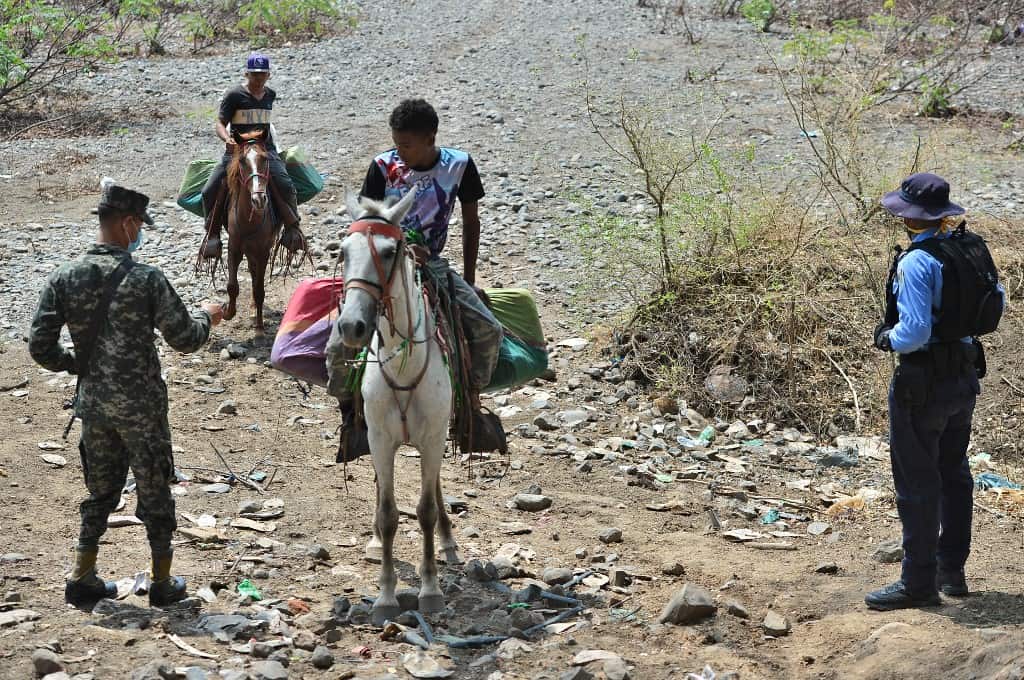Two policemen and a military officer escort a pair of young men off their horses near the shores of the Guasaule River. It’s part of their mission to block the entry of Nicaraguans to Honduras in the face of Managua’s apparent indifference to the coronavirus pandemic.
The riders turn out to be Hondurans crossing from Nicaragua through a blind spot on the border, carrying blocks of cheese to sell in their communities.
“We are all hungry,” justifies a Honduran police officer who lets the two young men through without penalty.
The mission of Honduran officials deployed at the border is “to avoid contagions from Nicaraguan personnel who come with the virus,” Lt. Carlos Wilfredo Cruz, armed with an M-16 rifle, told AFP.
Honduras and Costa Rica have both tightened border surveillance in recent weeks to protect themselves against what both governments consider to be an inadequate response by Nicaragua to the COVID-19 pandemic.
While many countries adopt restrictive measures, including stay-at-home orders and border closures to contain the coronavirus, in Nicaragua no limitations have been decreed and, on the contrary, the government of Daniel Ortega has called for mass marches and celebrations.
Ongoing concerns with Nicaragua
The deployment of police and military stretches from customs to a dozen blind spots across the river, which has been turned into a bed of rocks by a severe drought. Authorities also patrol the undergrowth, where illegal trade flows in both ways — such as that of smuggled cheese.
While Honduran police and military prevent Nicaraguans from entering through blind spots, customs, health and immigration authorities have also reinforced epidemiological surveillance near the border.
“We are concerned that the sister republic of Nicaragua is not taking any protection measure” against the pandemic, said border customs administrator Rosana Ventura.
“Our concern is latent because we are at a border post with a country that is not taking protection measures,” she stressed.
Ventura indicated that about 900 trucks that transport goods cross every 24 hours through that customs office.
A doctor who examines the truckers, José Alfredo Sánchez, says that the transporters inform him that in Nicaragua there are no protection measures like in the rest of Central America.
“We do not know what number of people are infected in Nicaragua, because Nicaragua is not doing any tests, so that guarantees that the number they are giving is not real,” the doctor warned.
Testing and drones in Costa Rica
Nicaragua officially reports eight deaths and 25 cases of coronavirus, although civil organizations have reported more than a thousand infections and nearly 200 deaths.
Sánchez is in charge of approving the entry of truckers into Honduran territory after taking their temperature, asking them if they have symptoms of COVID-19 and alerting them to the risks of the disease.
After passing a consultation with Sánchez, the Guatemalan transporter Edy Roberto Taltique, 50, who is carrying a shipment of reels of paper from Costa Rica to Guatemala, said that Costa Rican authorities are taking better measures against the disease.
“In Costa Rica, at the border, at the entrance, a swab is mandatory before entering the territory and from there (the sample) goes to the laboratory, they give the results and you can enter,” he said.
Costa Rica began testing all truckers who enter the country with cargo, and those with symptoms such as nasal congestion or cough are not allowed to enter, according to Health Minister Daniel Salas.
Additionally, the country mobilized its six police forces, including the Judicial Investigation Police (OIJ), to strengthen border surveillance and contain the entry of Nicaraguans.
Costa Rica has a population of about 500,000 Nicaraguans who regularly move between the two countries, but San José prevented the re-entry of its northern neighbors as part of actions to combat the pandemic.
Additionally, it uses drones to monitor the border from the air and installed an air field in the border area to carry out air patrols, according to the Ministry of Public Security.
Nicaragua condemns ‘xenophobic’ politics
More than 50 members of Costa Rica’s Legislative Assembly asked the Pan American Health Organization (PAHO) to intervene in Nicaragua, citing the country’s lax response to the coronavirus.
In response, Nicaraguan lawmakers asserted that Costa Rica’s requests were “xenophobic and racist.”
“[The Costa Rican letter] reflects xenophobic and racist positions and is not the first time that they have expressed that against Nicaragua,” the response read.
The deputies argued Costa Rica’s concerns regarding Nicaragua’s coronavirus response demonstrated “arrogance and superiority” which are “not appropriate among Central American peoples.”






